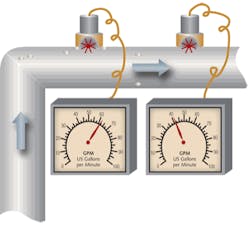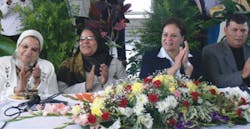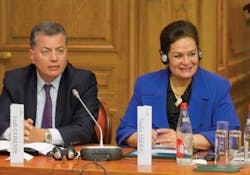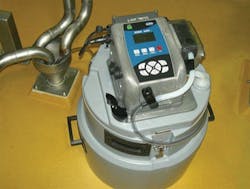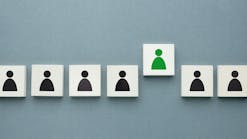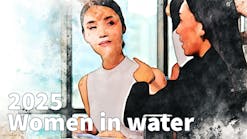World Water Council President Reveals All
Leading the World Water Council and also the recent World Water Forum, Loïc Fauchon is taking on the task to increase sustainable water and sanitation access globally. WWi finds out why he doesn't like the phrase 'water-energy nexus' and why he believes the time of 'easy water' is over for consumers and farmers.
Loïc Fauchon is an honest man. As president-general director of the Marseilles Water Supply Company, not to mention leading the World Water Council and being responsible for the recent World Water Forum attracting more than 35,000 participants, you would think he'd be the first to boast being a water specialist. Instead he admits his strengths lie elsewhere.
"I have been involved in water for more than 20 years," he says. "I am more of a specialist in urban management than water. And I'm not an engineer. I am coming from the political side, not the technical side."
It was in 1991 when he first joined the Marseille water firm and has been president of the World Water Council since 2004. Leading the council through the World Water Forum in Mexico 2006, Turkey 2009 and France 2012, it is this event where efforts of his organisation are put under scrutiny. With over 100 ministers present from over 170 represented countries, the week is packed with roundtables, debates and dialogue.
Listening to feedback that past incarnations of the week-long forums focused more on debate and less on concrete solutions, the recent event in Marseille had the suitable sub-heading of "The time for solutions".
Water & Wastewater International magazine (WWi) caught up with Fauchon after the event but ahead of the United Nations Conference on Sustainable Development Rio+20 debate in June to find out the outcomes. Below is an abstract of the full interview.
WWi: The slogan of the Sixth World Water Forum was 'Time for Solutions and commitments'. Can you tell me about what proposed solutions and commitments came out of the week long event?
Loïc Fauchon (LF): We decided three years that this forum could be and will be the forum of solutions. One month from now I can say that I'm very satisfied with this particular issue. More than 1400 solutions concerning water and sanitation, technical, financial and political have been posted on the dedicated platform that has been organised. Just before the closing ceremony more than 100 concrete commitments were presented. Solutions and commitments I hope will allow better and faster access to water and sanitation. This is very important. For the first time in these important meetings, political leaders, NGOs and economic stakeholders have been forced to come and present solutions, and commit to delivering them. The World Water Council has its own commitment that I presented during the closing ceremony.
WWi: The Forum adopted a Ministerial declaration, following the Istanbul Pact three years ago at the last World Water Forum. What was the purpose of the declaration and how can you be sure that ministers' pledges will translate into action?
LF: We cannot be sure. The World Water Council and the Forum do not have any power. We just try to convince the participants - some ministers, some parliamentarians, some mayors and private companies - to place water on the top of their agenda.
It's very difficult to get an agreement between 140 countries on a ministerial declaration but these declarations, for the first time, have been clear on a few issues like human rights. Everybody now agrees to consider the right to water as a human right. We will probably organise, during the coming months, a new monitoring capacity to be able to understand the countries and cities that are really respecting commitments that they provided during the forum.
This ministerial declaration is very clear and not too long. Returning home, each minister can look at it and decide what to consider as a priority. We cannot do more than that. The World Water Council is not the UN. Even if we were the UN, you know very well that the UN is not able to control what each country does. I'm very confident after this forum that a lot of countries understood that they need to make water a higher priority.
Now we will continue between each forum to discuss with each country and government and encourage them to respect their commitment. I cannot say more, if I do say more than it won't be correct.
WWi: So the purpose of the Forum is to really give ministers as much information as possible so the hope is when they go back to their own countries they should prioritise water?
LF: As an example of the daily job of the council, from now till the beginning of July I will be visiting between 10-12 different countries and I will discuss with the political leaders concerning the capacity to apply new rules and new financial capacities to make water a priority. The Forum is one moment every three years where everybody meets, discuss and for the first time commits. After, between the Forums, we are discussing with our members and encouraging new members to join the council. Also, on this aspect I am more confident that compared to three or five years ago, we have a better awareness of the issues.
We are seeing it very differently now. When the president of the World Water Council is visiting a country he is hosted by the president or prime minister. Ten years ago he would be hosted by the director of engineering in the ministry covering water. Water is now totally considered as a political issue.
WWi: With the range of countries you visit, you must see a complete range of water issues, from countries relying almost 100% on desalination in the Middle East, to countries with adequate but contaminated water supplies?
LF: Qatar is a very good example of a country that knows scarcity. They have to develop in two directions that are opposite. On one hand they have to find more water resources and for this country desalination is an important solution, for others it could be a transfer of water from one region to another. And on the other hand they are consuming a lot of water, per person, so they have to implement a policy to regulate water demand.
It has to be done, like in the majority of other countries in the world, at the same time. More water has to be offered while consuming less and managing better, which is essential. Take countries like Qatar, Kuwait Bahrain and Saudi Arabia. They are growing quickly but they understand that they cannot consume water as they have done for the last 10 or 20 years.
WWi: During the Forum you endorsed 'drop by drop' technology solutions for farmers. Should the event concentrate its efforts more on convincing countries to improve their farming water habits?
LF: The question of water in food production is very complex because it's very different from one country to another. And it's different depending on the part of the world.
First I would like to say on a human approach that farmers should not be considered as guilty of anything.
If the farmers are wasting water then it's because water policies are not efficient and most of the time water policies are not courageous. Water policies are made by the politicians and not the farmers. Saying that and moving to the more technical aspects, for water and agriculture it's the same message for the consumer: the time of easy water is over.
We need to encourage farmers in each country to manage water better. It's very necessary and this is not the case in the majority of countries in the world. Farmers, most of the time, do not have money for that. It will take time and will cost a lot of money.
In this forum we have produced a lot on the fact that agriculture policy for water, or the water policy for food, has to be linked to the energy policy. That's the reason during the second day of the forum, I signed an agreement with the president of the World Energy Council (see box out).
WORLD WATER COUNCIL WORLD ENERGY COUNCIL COOPERATION
Under the cooperation signed in March at the World Water Forum, the two organisations will:
Share data, studies, and information, and contribute to their mutual visibility , including:
- Studies by the World Energy Council: Energy for Water (2010); Policy Assessment: Review of Energy and Climate Policies; Energy Policy Scenarios to 2050; and Energy and Urban Innovation
- The ongoing work, Water and Green Growth, led by the World Water Council and the South Korean government
- Discuss and consult with each other on future studies and research on water and energy - - Ensure that both water and energy are considered in the work of both organisations
- Organise specific sessions or workshops in the core programmes of both organisations' World Congresses
- Advance tangible solutions on both local and regional levels
- Promote the communication on issues related to the "water-energy nexus"
We will work together on the issue of water and energy for food security and also for health security. I don't like to use the phrase water-energy nexus. It's very important to work on these issues at the same time. It's very important to repeat this to political leaders. Food and health are part of the same challenge.
WWi: Why don't you like the term water-energy nexus?
LF: I don't like "nexus" because 99% of people don't understand what nexus means. And I don't like it when a political reference is used that people don't understand. If you say water and energy link for food production and security, then everybody understands but it's not as fashionable.
WWi: The UN's Millennium Development Goal (MDG) to halve the number of people without access to safe drinking water has been met. Sanitation is a different story with around 2.5 people still lacking basic sanitation. How can future forums really help deliver sanitation solutions and remove the political taboo of wastewater compared to drinking water?
LF: I do not have the solution. You spoke about the political taboo. It continues to be right in a few countries but it changes over the last 10 to 15 years. Today, wastewater processing is part of the water cycle.
For professionals like us, when we are saying water, we are also considering sanitation or wastewater processing. If you are the minister or mayor of a city in a poor country, first you try to organise the water supply for the population.
If you have money, time and competence, you also try to make something for sanitation. I have two to three considerations. First, in this forum as a platform for solutions; sanitation has a very important place, more than ever. I have also been chairing an NGO called Transahara for 35 years, which represents sub-Saharan countries in Africa and I have devoted part of my life to that.
I can say that there is a danger with bringing water to countries without being able to solve the question of sanitation. You are very proud when you are able to bring water to a population. It's hard to imagine that if you organise the supply of water that a year after there is the arrival malaria.
When you bring water to rural areas of a village, you provide more opportunities for mosquitoes to develop and in turn, spread malaria. One or two years after bringing water supplies to a village in Africa, you are obliged to solved the question of sanitation and organise the sanitation network.
This is not very easy. Yes, we have made great progress in delivering sanitation but no, it's not sufficient and we have to find more financial capacities, more know-how and more regulation to oblige the cities and rural areas to make sanitation more of a priority.
There is a very concrete solution that's been implemented in a few European countries, which is the case for 20 years in France, which obliges the cities to have two different budgets for water and sanitation. One budget for water. One budget for sanitation. The result is very interesting.
The mayor of the municipal council may not take the money which is placed for sanitation and use it for water supply. You would then have to pay a fine if you do not respect this regulation. It can change the situation in a country, because the sanitation will make a lot of progress because more money will be directed towards it.
WWi: What water and sanitation commitments/developments does the World Water Council expect to come out of Rio+20 summit in June?
LF: The question doesn't only concern Rio+20, it concerns all of the world political meetings. The Rio+20 is a very important moment and the Council will be part of the water process in this summit. We are currently in discussion with the UN and Brazilian government so that water will be considered officially as one of the 9th or 10th main themes of the Rio+20 agenda. It's the first time. It was not considered as a priority in the Johannesburg Earth Summit.
Fast Facts: Loïc Fauchon's career
- Gained a post-graduate degree in Political Sciences (international relations section) from the Institute of Political Studies of Aix-en-Provence, France in 1970.
- In the same year, he received a diploma in higher economic studies at the faculty of economic sciences of Aix, and two years later he earned a doctorate (Ph.D) in economics and law.
- Following these studies, he became general secretary of the Regional Group on Tourism and Leisure with the Prefecture of the Provence-Alpes-Côte d'Azur region.
- In 1975, he became Project Officer at ICOREM, a computer company of public services.
- Between 1977 and 1979, he worked as general secretary of the 'Syndicat mixte de l'aménagement du Verdon', and joined the Regional Council of Provence-Alpes-Côte d'Azur one year later, first as a project officer in the president's office, then as director of this office (1980-1983).
- Created the association Transahara in 1977, for which he has traveled to Romania, Bosnia, Mali and Tunisia on emergency and development assistance missions.
- Between 1983 and 1986, he was the assistant director in the Mayor's office of Marseilles, France, and until 1991 he worked as assistant secretary general of the City of Marseilles, in charge of international relations and of the city center.
- In 1991, he joined the general management of the Marseilles Water Supply Company (SEM) and became President-General Director in 1997.
- Served as Mayor of Trets, France, from 1989 to 1992
- Fauchon has been a governor of the World Water Council since 2000, first as a special advisor to the president, then as vice-president from October 2004, and finally as president since March 2005.
We need to place water security as a strategic goal in the future of the world and in the most important meetings and organisations. We would like to see the G8 and G20 consider these issues in their next meetings. We hope that in the UN meeting in July one complete day will be dedicated to water. With our friends around the world we try to push water to a more important place in the climate negotiation.
So in every type of political meeting and place to decide that we would like to have water in a better position and top of the agenda. And it's changed a lot. The UN General Assembly Climate Negotiation was not the case three years ago. I think it will be the case in Rio and afterwards.
More Water & WasteWater International Current Issue Articles
More Water & WasteWater International Archives Issue Articles
